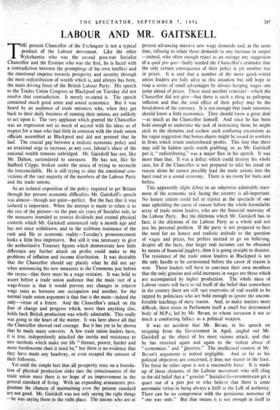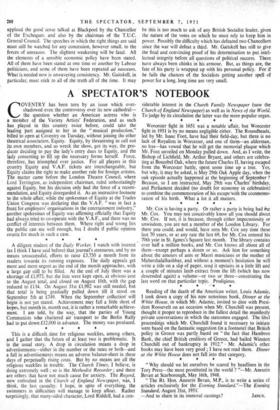LABOUR AND MR. GAITSKELL
THE present Chancellor of the Exchequer is not a typical product of the Labour movement. Like the other Wykehamist who was the second post-war Socialist Chancellor and the Etonian who was the first, he is faced with a contradiction between the promptings of his own intellect and the emotional impetus towards prosperity and security through the mere redistribution of wealth which is, and always has been, the main driving force of the British Labour Party. His speech to the Trades Union Congress at Blackpool on Tuesday did not resolve that contradiction. It merely re-stated it. The speech contained much good sense and sound economics. But it was heard by an audience of trade unionists who, when they get back to their daily business of running their unions, are unlikely to act upon it. The very applause which greeted the Chancellor was an expression not so much of accord with his ideas as of respect for a man who had little in common with the trade union officials assembled at Blackpool and did not pretend that he had. The crucial gap between a realistic economic policy and an irrational urge to increase, at any cost, labour's share of the national wealth remains unbridged. Mr. Gaitskell -has not, like Mr. Dalton, surrendered to unreason. He has not, like Sir Stafford Cripps, broken under the strain of trying to reconcile the irreconcilable. He is still trying to alter the emotional con- victions of the vast majority of the members of the Labour Party and the trade unions.
AS.an isolated exposition of the policy required to get Britain through her present economic difficulties Mr. Gaitskell's speech was almost—though not quite—perfect. But the fact that it was isolated is important. When the attempt is made to relate it to the rest of the picture—to the past six years of Socialist rule, to the measures intended to restrict dividends and extend physical controls which Mr. Gaitskell announced only a-month ago and has not since withdrawn, and to the stubborn resistance of the rank and file to economic reality—Tuesday's pronouncement looks a little less impressive.. But still it was necessary to give the authoritative Treasury figures which demonstrate how little difference any further attack on profits could make to the problems of inflation and income distribution. It was desirable that the Chancellor should say plainly what he did not say when announcing his new measures to the Commons just before the recess—that there must be a wage restraint. It was bold to assert before a trade union audience that the main vice of a wage-freeze is that it would prevent any changes in relative wage rates as between one occupation and another, for the normal trade union argument is that that is the main—indeed the only—virtue of a freeze. And the Chancellor's attack on the fear of change and 'progress which, more than anything else, holds back British production was wholly admirable. This really was going to the heart of the matter. It was here above all that the Chancellor showed real courage. But it has yet to be shown that he made many converts. A few trade union leaders have, it is true, independently attacked the inertia and resistance to new methods which make our life " thinner, poorer, harder and more burdensome than it need be," but there is no evidence that they have made any headway, or even escaped the censure of their followers.
Yet until the simple fact that all prosperity rests on a founda- tion of physical production sinks into the consciousness of the trade union mass there is no hope of an improvement in the general standard of living. With an expanding armaments pro- gramme the chances of maintaining even the present standard are not good. Mr. Gaifskell was not only saying the right things —he was saying them in the right place. The 'unions who are at present advancing massive new wage demands and, at the same time, refusing to relate those demands to any increase in output —indeed, who often enough reject as an outrage any suggestion of a quid pro quo—badly needed the Chancellor's reminder that the only certain consequence of their policy is yet another rise in prices. It is said that a number of the more quick-witted union leaders are fully alive to this situation but still hope to reap a series of small advantages by always keeping wages one jump ahead of prices. These need another reminder—which the Chancellor did not give—that there is such a thing as galloping inflation and that the total effect of their policy may be the breakdown of the currency. It is not enough that trade unionists should know a little economics. They should know a great deal —as much as the Chancellor himself. And since he has been bold enough to undertake the task of instructing them, he might stick to the elements and eschew such confusing excursions as his vague suggestion that bonus shares might be issued to workers in firms which retain undistributed profits. This hint that there may still be hidden spoils worth grabbing, or, as Mr. Gaitskell put it, " redistributing," was a major flaw in his speech. It was more than that. It was a defect which could destroy his whole case, for if the Chancellor is not prepared to take his stand on reason alone he cannot possibly lead the trade unions into the hard road to a sound economy. There is no room for baits and bribes.
This apparently slight defect in an otherwise admirable state- ment of the economic task facing the country is all-important. No honest citizen could fail to rejoice at the spectacle of one man upholding the cause of reason before the whole formidable array of trade union leaders, who are the financial mainstay of the Labour Party. But the dilemma which Mr. Gaitskell has to face, is the dilemma of the Labour Party as a whole and not just his personal problem. If the party is not prepared to face the need for an honest and realistic attitude to the question of wages and prices, but prefers instead to go on believing, despite all the facts, that larger real incomes can be obtained by means of financial jugglery, then it is going straight to disaster. The resistance of the trade union leaders at Blackpool is not the only hurdle to be surmounted before the cause of reason is won. Those leaders will have to convince their own members that the only genuine and solid increases in wages are those which are accompanied by higher production. The whole mass of Labour voters will have to rid itself of the belief that somewhere in the country there are still vast reservoirs of real wealth to be tapped by politicians who are bold enough to ignore the uncom- fortable teachings of mere reason. And, to make matters more difficult, there exists in Parliament itself a small but determined body of M.P.s, led by Mr. Bevan, to whom unreason it not so much a comforting fallacy as a political weapon.
It was no accident that Mr. Bevan, in his speech on resigning from the Government in April, singled out Mr. Gaitskell as the object of his most vicious attack, and that he has returned again- and again to the violent abuse of " economists " and " theorists." The intellectual content of Mr. Bevan's arguments is indeed negligible. And so far as his political objectives are concerned, it does not matter in the least. The force he relies upon is not a reasonable force. It is made up of those elements of the Labour movement who still cling to the old belief that a " genuine " Socialist Government-can get 'a quart out of a pint pot or who believe that there is some automatic virtue in being always a little to the Left of authority. There can be no compromise with the pernicious nonsense of "one way only." But that means. it is not enough in itself to applaud the good sense talked at Blackpool by the Chancellor of the Exchequer, and also by the chairman of the T.U.C. General Council. The speeches in which the right things are said must still be watched for any concession, however small, to the forces of unreason. The slightest weakening will be fatal. All the elements of a sensible economic policy have been stated. All of them have been stated at one time or another by Labour politicians, and some of them have been repeated ad nauseam. What is needed now is unwavering consistency. Mr. Gaitskell, in particular, must stick to all of the truth all of the time. It may be this is too much to ask of any British Socialist leader, given the nature of the votes on which he must rely to keep him in power. Possibly the difficulty which has defeated two Chancellors since the war will defeat a third. Mr. Gaitskell has still to give the final and convincing proof 'of his determination to put intel- lectual integrity before all questions of political success. There have always been chinks in his armour. But, as things are. the fate of his party is wrapped up with his personal policy. For if he fails the chances of the Socialists getting another spell of power for a long, long time are very small.



































 Previous page
Previous page